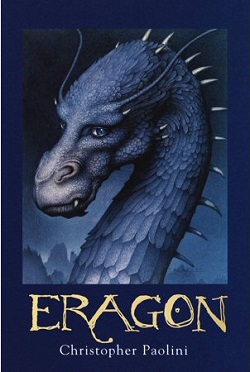 by Christopher Paolini
by Christopher Paolini
Conditional Recommendation: A fifteen-year-old farm boy hatches a dragon egg and begins the long journey of legacy of avenging his uncle and learning the ways of dragon riders.
Genre: Fantasy
It’s hard to accurately capture the scope of this book with words. It’s an experience. It’s like Lord of the Rings and Harry Potter—a small and big story all at the same time. I read this book so many times as a teen that my hardcover copy is quite battered. I loved the adventure and imagination, the world-building, and flying on the back of a dragon. When I was younger, I day dreamed all the time about flying so books like this one easily captured my imagination.
Side note: The Eragon movie is garbage; it does no justice to the book. Don’t watch it.
When Eragon finds a polished blue stone in the forest, he thinks it is the lucky discovery of a poor farm boy; perhaps it will buy his family meat for the winter. But when the stone brings a dragon hatchling, Eragon soon realizes he has stumbled upon a legacy nearly as old as the Empire itself. Overnight his simple life is shattered, and he is thrust into a perilous new world of destiny, magic, and power. With only an ancient sword and the advice of an old storyteller for guidance, Eragon and the fledgling dragon must navigate the dangerous terrain and dark enemies of an Empire ruled by a king whose evil knows no bounds. Can Eragon take up the mantle of the legendary Dragon Riders? The fate of the Empire may rest in his hands….
The story starts with an ambush and an unexplained magical event before introducing you to the fifteen-year-old farm boy, Eragon. This book appeals to our inner wonder—you know that special curiosity that usually dims as we age?—and to our desire to take part in something magical and bigger than ourselves. You go on a journey as much as Eragon does. For that reason, I’d say this is an accomplished work of fiction. Eragon is not a distinct personality and this allows the reader to easily assimilate themselves into the story as if they were Eragon, rather than simply reading about him. It’s you riding on dragon back over the forest; it’s you learning about magic from the storyteller; it’s you fighting foes and desperately hoping you’ll survive. Eragon is a fantastic experience in fantasy and a great escape.
Though Eragon himself isn’t particularly deep in this book, he is likeable and good-natured, if a bit ignorant most of the time. Since he’s an uneducated, poor peasant, it’s not surprising that his character starts out so simple. After the dragon hatches and he’s mentally linked with her, he grows in earnest throughout the book and it’s enjoyable to see his understanding of the world expand.
Eragon’s simplicity notwithstanding, the other characters in the book are delightfully unique and noteworthy. From the villagers of Carvahall to the kooky witch Angela and the werecat Solembum, all of the people and creatures of Alagasia are interesting, colorful, well-depicted and true to the characteristics of their individual cultures and races. All the characters that you come to know in Eragon appear again in the series so you’ll be able to enjoy them for a long while, unless, of course, they die….
I really enjoy the plot to this story—it’s a hero’s journey with enough suspenseful twists and turns, secrets revealed and kept, battles fought, loss and gain. It’s a true adventure. I’ve heard some readers consider it slow and I can see how they would say that but I think the moderate pacing allows the reader to empathize with Eragon, his toils and his victories. What I also love is, like Harry Potter, the plots within plots and this book (though a complete story in itself) is part of a larger story in the series.
It ends in the right place on a bittersweet note, but with hope. Stories that end with hope are my favorites because for the believer it’s true to life in that we, no matter our ending on earth, have a sure hope. The ending is a little bit of a cliffhanger but not soul-wrenchingly so.
The system Paolini created for magic in this series is based on the use of what he calls the “ancient language”. It’s as if a particular language itself is magic and the more vocabulary one knows the more he is able to do. Each act of magic has physical consequences—the energy required for the magic to complete a task is sapped from the wielder’s body and they become tired, exhausted, or even die if it’s too much for them. There are other types of magic that elves, dragons, witches, and sorcerers practice, but using the ancient language is the primary magic system. There’s a lot of explanation in this book and even more in the next about the constructs of the magic that Paolini has devised. His world-building and therefore his magic system is very inventive and thorough.
This book is a conditional recommendation because of the violence and creepy creatures. Paolini is never short on his descriptions so the violent scenes can be a bit gory. Some violence is portrayed as commonplace such as a right way to teach another person respect or a way to resolve conflict. It’s unfortunate but I can’t think of a situation where those rash acts are rewarded in the book. Evil is very much present in the book but it’s always treated as such and the characters react to it with horror, dismay, revulsion, a sense of justice, or in a less-noble case, revenge. Revenge is a common motivator in this book—a blow for a blow, a death for a death, they will pay for what they did to so-and-so, etc.
*This post may contain affiliate link(s). See full disclosure on legal page.
